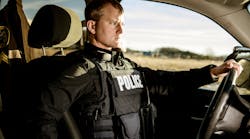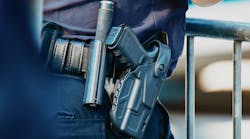As a police trainer and author, I am constantly studying the circumstances in which law enforcement officers are killed or injured in the line of duty. National Police Week is traditionally a time to reflect on where we’ve been and then look ahead to see where we need to go to enhance officer safety. It’s no secret that American police deaths are on the rise. As of today’s date, we’ve lost 71 law enforcement officers in the line of duty in 2011, and seven of them were female.
The first line of duty death this year occurred on New Year’s Day in Clark County, OH as Deputy Suzanne Hopper was gunned down investigating a “shot fired” call in a rural trailer park. Nineteen days later Miami-Dade Detective Amanda Haworth was shot and killed along with Detective Roger Castillo as their team attempted to serve a homicide warrant. The following week Washington State Department of Corrections Officer Jayme Lee Biendl was strangled to death by an inmate she was guarding inside the prison’s chapel.
In late February, National Park Service Ranger Julie Weir was driving from Pennsylvania to a new post in California when her vehicle collided with a tractor trailer in Nebraska during a heavy snow storm, she died from her injuries. On March 4th, District Administrator Debra Collins of the Missouri Department of Corrections was on her way to a meeting when her vehicle left the roadway and overturned in a ditch, causing fatal injuries. Ten days later San Antonio, TX police officer Stephanie Brown, the daughter of a fellow SAPD officer, was killed when a vehicle traveling the wrong way struck her patrol car head-on. Finally, on April 18th, part-time Bowie County, TX deputy Sherri Jones was shot and killed in the basement of the county courthouse when a male prisoner gained control of her pistol, fatally shot her and then escaped in the transport van.
I spend about half of my work life conducting women’s officer and career survival training, which includes telling the stories of our fallen female heroes is a meaningful way to both honor and remember them. The seven women who have died so far this year varied in age from 27 to 55, with an average of 12.5 years on the job. They left parents, spouses, partners, children, and grandchildren as well as brokenhearted friends, agencies, and communities. Each time a police officer is killed, even as we mourn, we are inspired to strengthen our resolve to improve our own safety and survival and that of those we train, supervise and manage. Here are just of few of the many reminders we need to consider each and every day on this job.
“Don’t Fight Fair!” I know many female officers, myself included, who would rather fight a male offender than another woman. Women have a reputation for “fighting dirty,” pulling hair, scratching, kicking, whatever. As a cop, remember that you’re not expected to “fight fair,” you’re expected to WIN quickly as well as legally and ethically. The faster you can end a physical altercation in your favor, the less likely the odds that you or the offender are going to get hurt. Learn to fight explosively, or as my friend and fellow trainer Hank Hayes says, fight “like a raccoon in a dumpster.” Police use of force isn’t pretty, but that doesn’t mean it has to be “brutal.”. If you’re in a physical fight for your life, by all means, fight like a girl. In other words, use everything you have and more, mentally, physically, and tactically, to win!
“Trust Your Instincts.” Women have great instincts. We have outstanding sensory perception, our brain has a tendency to check in with our gut pretty regularly, and as Gavin deBecker points out in his classic book The Gift of Fear, we should take advantage of and trust our instincts more often than not. If something feels wrong, step up your awareness. Read the whole scene, ask questions, find out why something “feels hinky” or “doesn’t smell right.” If it feels wrong, it probably is. It’s not paranoia if someone really is trying to hurt you, or is thinking about it. Sometimes female police officers will ignore their gut in a mis-guided attempt to prove they’re tough. Disregarding your instincts is foolish, not tough. If you learn to sharpen and trust that “gift of fear,” you’re going to be a safer, and a much better, crimefighter.
“Driving is a Dangerous Activity” In the last 16 months eight female police officers have been killed in vehicle-related incidents. All of them were driving. We are in and around motor vehicles constantly. We are comfortable driving at high speeds, investigating accidents on busy roadways, conducting vehicle stops, directing traffic and just routinely operating motor vehicles. Watch your speed, even on emergency runs, wear your seatbelt and your body armor, minimize distractions, and make sure you’re not driving fatigued. Operating a motor vehicle is a perishable skill, and it’s serious business, do everything you can to mitigate your risks.
“Train Constantly.” Many of the women I speak to complain that their department won’t send them to training. This is often a legitimate complaint; training budgets have been slashed and personnel cuts make days off for training more difficult than ever. How do we overcome this one? First of all, learn to take what you can get and be creative. The department may not be able to send you to a week long survival school, but will they give you a day or two off to attend some local training? Or will they give you the training time if you pay for the class or conference yourself? It doesn’t hurt to ask, and investing in your own safety and survival is a great way to spend your hard-earned cash. Consider offering to host a training class at your department or through your union or association; very often the host agency receives free seats in the class. Second, re-define your idea of what “training” is. Spending five or ten minutes viewing an Internet dash-cam video, watching a short webinar, or listening to a podcast or an audiobook can all be effective ways to improve your officer (and career) survival. You can also practice physical skills on your own. Dry-fire your pistol using one of the many great trigger or sight drills out there, get out your handcuffs and partner up with someone else on your shift to practice with, and most of all, visualize, visualize, visualize. The mind/body connection is powerful, use it!
Honoring our fallen doesn’t just mean remembering them, it also means telling their stories; in class, in roll call, even over the lunch table, and learning from each and every one of them, male and female. Always remember that law enforcement is a brotherhood, we are a family, and we need to work hard every single day to help keep each other, and ourselves, safe.
Web Links:
About The Author:
Sgt. Betsy Brantner Smith is a 29-year veteran of a large suburban Chicago police department. Recently retired as a patrol supervisor, she has held positions in patrol, investigations, narcotics, juvenile, crime prevention and field training. As a sergeant, she supervised her department's K-9 Unit, served as a field training sergeant, recruitment team sergeant, bike patrol coordinator, the Crowd Control Bike Team supervisor, and supervisor of the Community Education/Crime Prevention Unit.
As a patrol sergeant, Betsy served on the Elderly Services Team, the Crisis Intervention Team, and was a supervisory member of the Honor Guard Unit. From 1999 - 2003 Betsy hosted various programs for the Law Enforcement Television Network and served as a content expert.
A graduate of the Northwestern University Center for Public Safety's School of Staff and Command, Betsy writes for numerous law enforcement and government publications including and is a regular columnist for many police websites including Police Link. A content expert and instructor for the Calibre Press "Street Survival" seminar since 2003, Betsy also serves as an on-air commentator and advisor for Police One TV and was a featured character in the Biography Channel’s “Female Forces” reality show. Betsy has been a law enforcement trainer for over 20 years and is a popular keynote speaker at conferences throughout the United States and Canada and beyond.
Betsy is the lead instructor for the Calibre Press “Street Survival for Women” seminar and manages Dave Smith & Associates. Together, Betsy and Dave teach courses through “Winning Mind Seminars,” an Illinois based company. She can be reached through her website at www.femaleforces.com.


